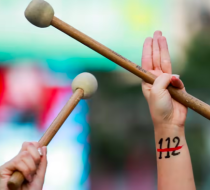Thai youth takes creative defiance into election Favorite
As the No. 59 bus hurtled down Ratchadamnoen Klang road in Bangkok's Old Town, its passengers diverted their attention from the intense midday heat to a small crowd on the concrete below. About 25 people were marching and chanting, photographers scuttling in front of them.
The protesters were calling for the release of imprisoned political activists. Some were giving the three-finger salute that has become a symbol of resistance in protests across Asia. A yellow sign displayed the number 112 struck through in red, reflecting demands for the repeal of Section 112 of the Thai criminal code, also known as the lese-majeste law, which bars criticism of Thailand's monarchy and carries a maximum 15-year prison sentence.
Although tiny by comparison, the demonstration recalled widespread antigovernment protests in Thailand between 2019 and 2021 when campaigners demanded constitutional change, an end to military-backed government and reform of the monarchy, using music, art and social media to avoid falling foul of the lese-majeste law.
Such demonstrations have been rare over the past year, discouraged by arrests of high-profile protest leaders and infighting within the movement. But there are signs of a potential resurgence in the coming months, especially if the results of a national election scheduled for May 14 are perceived to be undemocratic.
The 2019-21 protests were led by young campaigners energized and organized by social media posts, music and art. Rap music -- and specifically the group Rap Against Dictatorship (RAD) -- acted as a critical mouthpiece for those unable to make their voices heard on a wider scale. Explicit lyrics over jagged and bass-heavy beats denounced Prime Minister Prayuth Chan-ocha, who seized power after a military coup in 2014 and remained in office after a disputed election in 2019. Music has long been a feature of Thai protests. Traditional Thai country music known as luk thung has been described historically as the music of the nation's rural peasants and working class, and was a feature of protest music during political conflicts in the 1970s. But RAD's involvement in the 2019-21 protests made its members cult heroes, increasing political engagement among young Thais and globalizing knowledge of Thailand's political situation.
"Our music can influence the people as a statement from people of the youth generation to the conservatives," Protozua, a rapper from RAD, told Nikkei Asia. "Our songs collect the idea of both emotions and political ideas to the listener. Having some music to sing together in the movement gives moral support to the people while we are fighting against the establishment."








